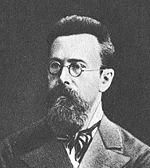- Mozart and Salieri
-
Operas by Nikolai Rimsky-Korsakov 
The Maid of Pskov (1872)
May Night (1879)
The Snow Maiden (1881)
Mlada (1890)
Christmas Eve (1895)
Sadko (1896)
Mozart and Salieri (1897)
The Noblewoman Vera Sheloga (1898)
The Tsar's Bride (1898)
The Tale of Tsar Saltan (1900)
Servilia (1901)
Kashchey the Deathless (1902)
Pan Voyevoda (1903)
The Invisible City of Kitezh (1905)
The Golden Cockerel (1907)Mozart and Salieri (Russian: Моцарт и Сальери, Motsart i Salyeri) is a one-act opera in two scenes by Nikolai Rimsky-Korsakov, written in 1897 to a Russian libretto taken almost verbatim from Alexander Pushkin's 1830 verse drama of the same name.
The story follows the apocryphal legend that Antonio Salieri poisoned Wolfgang Amadeus Mozart out of jealousy over the latter's music.[1] Rimsky-Korsakov incorporated quotations from Mozart's Requiem and Don Giovanni into the score. Richard Taruskin has placed this opera in the historical context of the development of the realistic tradition in Russian opera.[2]
Contents
Performance history
The first performance took place at the Solodovnikov Theater in Moscow, presented by the Moscow Private Russian Opera, Moscow on 7 December 1898 O.S. 25 November. The conductor was Iosif Truffi and scenic designer was Mikhail Vrubel.
Fyodor Shalyapin, who originated the role of Saleri, claimed to have often sung the piece as a monodrama, as the role of Mozart goes no higher than g and was within his range.
In Britain the first UK performance was presented on 11 January 1927[3], while the first U.S. one took place in Forest Park, Pennsylvania, in 1933.[4]
Roles
Role Voice type Premiere cast
Moscow, 7 December 1898
(Conductor: Iosif Truffi)Mozart tenor Vasily Shkafer Salieri baritone Fyodor Shalyapin A blind fiddler silent role Offstage chorus: sings a few bars of Mozart's Requiem Mass in the second scene. Synopsis
Time: End of the 18th century
Scene 1
Salieri enjoys high social position as a composer, and has dedicated himself to the service of his art. Secretly, however, he is jealous of Mozart's works because he recognizes their superior quality, especially given what he sees as the "idle" character of Mozart. Salieri invites Mozart to dinner and plans to poison him.
Scene 2
Mozart and Salieri are dining at an inn. Mozart is troubled by his work on his Requiem, which an anonymous stranger in black commissioned from him. Mozart notes that Pierre Beaumarchais and Salieri were once friends, but then asks if it is true that Beaumarchais once poisoned someone. Salieri then surreptitiously pours poison into Mozart's drink. Mozart begins to play at the keyboard, as Salieri begins to cry. Mozart sees this, but Salieri urges Mozart to continue. Mozart begins to feel ill, and leaves. Salieri ends the opera singing farewell to Mozart and comparing himself to Michelangelo.
Recordings
Audio Recordings (Mainly studio recordings) Source: www.operadis-opera-discography.org.uk Motsart i Salyeri (Russian)
- 1947, Samuil Samosud (conductor), Stanislavsky and Nemirovich-Danchenko Music Theatre, Sergey Lemeshev (Mozart), Alexander Pirogov (Salieri)
- 1951, Samuil Samosud (conductor), USSR Radio Orchestra and Chorus, Ivan Kozlovsky (Mozart), Mark Reizen (Salieri)
- 1974, Stoyan Angelov (conductor), Bulgarian Radio-Television Symphony Orchestra, Svetoslav Obretenov Chorus, Avram Andreev (Mozart), Pavel Gerdzhikov (Salieri), Teodor Moussev (piano), Raina Manolova (violin)
- 1986, Mark Ermler (conductor), Bolshoy Theatre Orchestra and Chorus, Aleksandr Fedin (Mozart), Yevgeny Nesterenko (Salieri), Vera Chasovennaya (piano), Sergey Girshenko (violin)
- 1994, Yuli Turovsky (conductor), I Musici de Montréal, I Musici de Montréal Choir, Vladimir Bogachev (Mozart), Nikita Storojev (Salieri)
- in German Mozart und Salieri 1982, Marek Janowski (conductor), Dresden Staatskapelle, Leipzig Radio Symphony Chorus, Peter Schreier (Mozart), Theo Adam (Salieri), Peter Rosel (piano)
Video
- VHS 1981, Live performance, Alexei Maslennikov (Mozart), Artur Eizen (Salieri), L. Novikov (Violinist), Orchestra and Chorus of the Bolshoi Theatre, Ruben Vartanian
References
- Notes
- ^ Davies, Peter J., "Mozart's Illnesses and Death - 2. The Last Year and the Fatal Illness" (October 1984). The Musical Times, 125 (1700): pp. 554-557, 559-561.
- ^ Taruskin, Richard (1970). "Realism as Preached and Practiced: The Russian Opera Dialogue". The Musical Quarterly LVI (3): 431–454. doi:10.1093/mq/LVI.3.431. http://mq.oxfordjournals.org/cgi/reprint/LVI/3/431. Retrieved 2007-10-16.
- ^ Holden, p. 752
- ^ Harlow Robinson, "Rimsky-Korsakov's Mozart and Salieri". New York Times, 16 August 1981.
- Sources
- Holden, Amanda (Ed.), The New Penguin Opera Guide, New York: Penguin Putnam, 2001. ISBN 0-140-29312-4
- Warrack, John and West, Ewan, The Oxford Dictionary of Opera New York: OUP: 1992 ISBN 0-19-869164-5
External links
Categories:- Operas based on works by Aleksandr Pushkin
- Operas by Nikolai Rimsky-Korsakov
- Russian-language operas
- Wolfgang Amadeus Mozart
- 1898 operas
- Operas
- One-act operas
Wikimedia Foundation. 2010.

